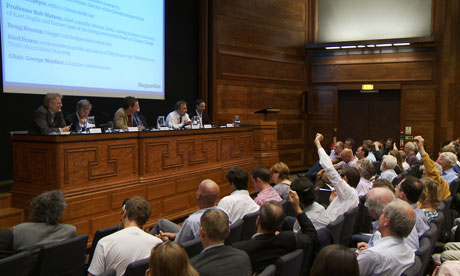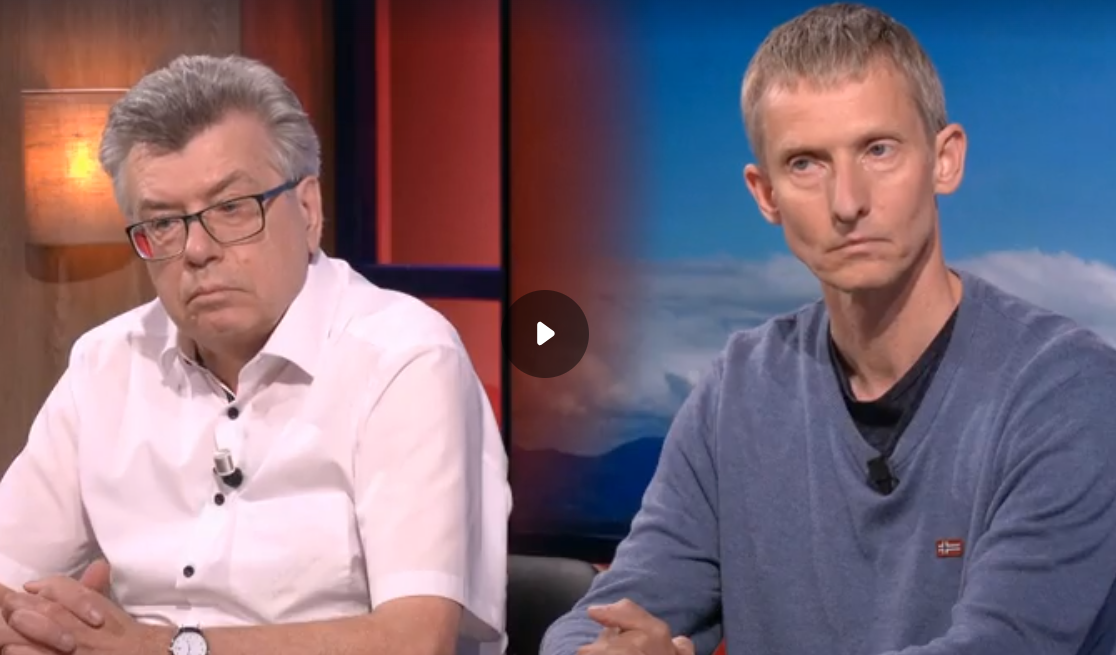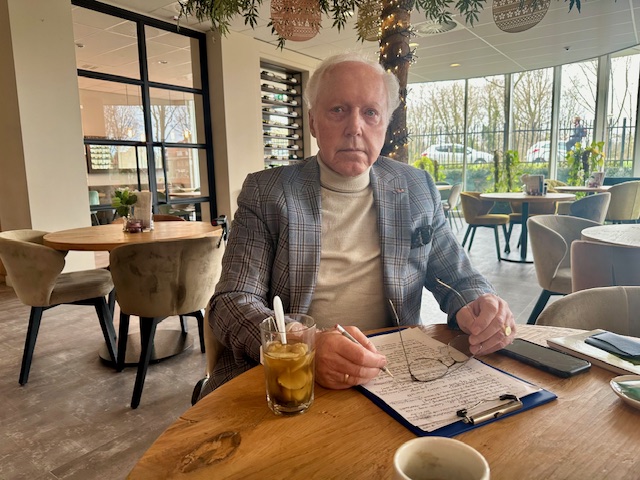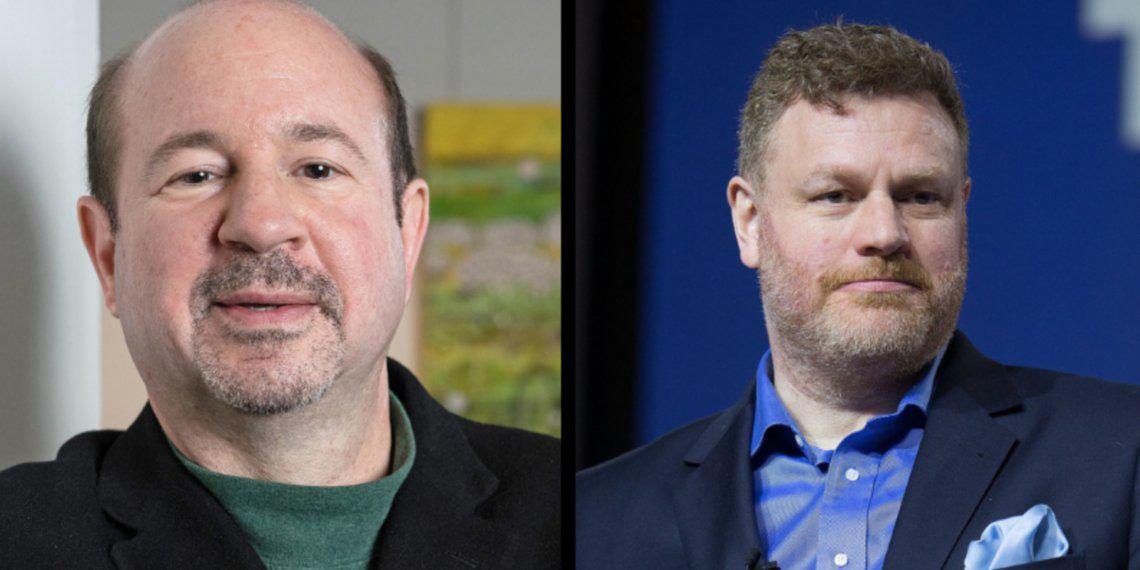Welke serieuze Nederlandse krant volgt het initiatief van de Britse Guardian afgelopen woensdag? Een echt open debat over klimaatwetenschap en -politiek naar aanleiding van de recente rapporten over CRU en IPCC. We tekenen nog wel even aan dat Steve McIntyre zijn deelname zelf heeft afgedwongen. Hij besloot op eigen kosten naar Groot-Brittannië te vliegen, nadat The Guardian hem een plekje in het panel had toegezegd. Hij stond niet op de eerste gepubliceerde lijst met namen. De kosten voor zijn bezoek zijn laten op galante wijze opgevangen door de fans van WUWT en ClimateAudit.org.
Dit was gisteren de headline:
‘Climategate’ debate: less meltdown, more well-mannered argument
Polemical and partisan characterises the climate debate online – but at last night’s Guardian debate there was courteousness and a distinct warmth in the air.
Something remarkable happened last night in the polarised world of “warmists” versus “sceptics”: a candid but not rancorous public debate. I’m sure you’ll correct me if I’m wrong but, to my knowledge, never before have all sides of this frequently poisonous debate shared a stage. The outcome was illuminating.
Surf snel door naar het artikel van Damian Carrington met daarin een 98 minuten lange audio van het debat en een 7 minuten lange video. Steve McIntyre is duidelijk geëmotioneerd.
Hieronder nog integraal Carrington’s profielschets van de panelleden:
There’s a news story here, but here’s my take on the panellists and the debate:
• Professor Trevor Davies, ex-head of CRU and now pro-vice chancellor for research at UEA: Davies had the toughest brief, given the lurid nature of some of the emails, which he said had initially “shocked” him, as well as the pounding UEA has taken in the media. But he was clear and calm, if a little stiff, backing the researchers’ science while fully acknowledging the need to work more openly and be more helpful in responding to FOI requests. Inevitably, he failed to woo a sceptical chunk of the audience, who jeered when he failed to recall the exact date when the last inquiry panel was set up, but all were glad he was there.
• Steve McIntyre, editor of ClimateAudit: It was hard to reconcile the much-demonised McIntyre with the open and avuncular Canadian on the stage. Despite being the highest-profile critic of CRU, he pointed out none of the three enquires had asked him to give evidence. He ducked a question on how much the Earth was warming – “I don’t know” – he was convincing in saying his motive had always been wanting the temperature data only because he felt it was important and should be available. He noted that if he was running a government, he would be taking action on climate change. Hardly a classic sceptic.
• Professor Bob Watson, chief scientific advisor at Defra, visiting professor at the University of East Anglia and former head of the Intergovernmental Panel on Climate Change: Watson took a twin-track approach: bluntly unequivocal that human activities are warming the planet but also genuine and insistent that sceptical views must be reflected in reports such as that by the IPCC: “We must not hide minority views”, when based on “evidence, not ideology”. But he added, reflecting on his work in the Clinton White House and the current UK government, that: “Evidence is a necessary but not sufficient condition for good policymaking.”
• Fred Pearce, environmental journalist and author of The Climate Files: Pearce was passionate in arguing that ‘Climategate’ was a very human tragedy, in respect of scientists feeling under siege and becoming fiercely defensive – which only spurred on the sceptics, who thought there must be something to hide. But he thought many CRU critics were not sceptics at all: “They are actually data libertarians, rather than climate sceptics, still less climate deniers. It turned into data wars.” Pearce’s conclusion was that at this turning point for climate science, more “candour” was needed from all.
• Doug Keenan, independent researcher and blogger, was focused and feisty, and did not hold back from his central theme that scientists of all stripes remain unacceptably unaccountable for the probity of their work: “Scientists are human and the prerequisite for integrity in human affairs is transparency.” He made allegations of fraud in climate science but revealed his true interests were not in climate change at all, but in the founding of early civilisations, archeo-astronomy and carbon dating.
The audience played a big part too, and was mixed with both warmist and sceptic points getting loudly cheered and booed. More than one suggested the media had hyped the “Climategate” tale beyond all reason, though none of the panel fully endorsed this view.
In the bar later, the extraordinary events continued, with Bob Watson and Doug Keenan swapping contact details and promising to stay in touch. Will the friendliness that broke out at the Guardian debate prove a mere holiday romance? Or will it be the start of a new way of conducting and communicating the science, especially online, that will shape how the world lives for centuries, as demanded by many?
I’m cautiously optimistic.
• The Climate Files: The Battle for the Truth About Global Warmingby Fred Pearce is available for £8.99 (RRP £11.99) from Guardian Books. To order visit guardianbooks.co.uk or in the UK call 0845 606 4232.







“Some parts of the debate have been edited out for legal reasons”
http://www.guardian.co.uk/environment/audio/2010/jul/15/guardian-climategate-hacked-emails-debate
Jammer, ik had graag het verhaal gehoord van Doug Keenan.
En The Spanish Inquisition maar afgeven of "onze" Steve McIntyre. Blijkt dat ie eigenlijk in zijn eigen kamp zit. Maar dat gebeurt wel vaker bij de inquisitie. Eerst op de brandstapel en daarna vragen stellen aan het slachtoffer (sorry TSI but Amadeus could not resist :-) )
Amadeus Gould
Amadeus posting count: today 2010-07-16: 1, this item: 1
Amadeus,
Afgeven? Nee hoor, ik ben altijd héél aardig tegen Steve McIntyre… en ik weet dat hij pro AGW is, zeg maar.
Alleen begrijp ik niet helemaal waarom hij door sommigen als een soort godheid van de klimaatwetenschap op een wit paard gehesen wordt.
Ik hoop trouwens dat-ie eens op vakantie kan, zonder mail en zonder hockeystick. Hij zag er erg moe uit.
Het was geen slecht debat trouwens, kon er wel mee door.
:-)
Douglas J. Keenan
Posted Jul 16, 2010 at 10:58 AM
The published (mp3) recording of The Guardian debate has my opening statement edited out (apparently for legal reasons). A transcript of the statement is at
http://www.informath.org/apprise/a4040/b100714.pd…
Ik ben trouwens een fan van McIntyre, hij zou m.i. een prijs moeten krijgen voor zijn vechtlust en volharding in zijn strijd tegen obscurantisten en bureaucraten.
TSI,
Leugenaar. 14 dagen geleden schreef je dit:
Iemand een saboteur en "eeuwige pestkop" noemen, is dat héél aardig zijn tegen hem?
J. Branders,
Ik neem toch aan dat je wel begrepen hebt dat mijn uitspraak:
vanzelfsprekend 'tongue in cheek' bedoeld was, zoals de Engelsen zeggen. Dat heet ironie, of misschien is het wel een vleugje sarcasme. Mijn mening heb ik hier niet bepaald onder stoelen of banken gestoken, en ik neem aan dat men daarmee bekend is…
Bovendien, ik bén best aardig tegen hem. Heb McIntyre één keer ontmoet en horen spreken, en diverse keren op Climateaudit met hem gebabbeld. Naar mijn mening is hij inderdaad ".. de eeuwige pestkop en zelf-benoemde ‘auditor’ McIntyre waar velen achter aan te blijven lopen".
Dat ik hem op persoonlijk vlak best sympathiek vind, neemt niet weg dat ik zijn campagne jegens de CRU en Mann/Briffa grotendeels als pesterij beschouw. Het heeft mij verbaasd dat hij zijn 'auditing' vak als vanzelfsprekend van toepassing heeft verklaard op specifiek deze onderzoekers. Bij een bedrijf of overheidsinstelling dien je eerst een mandaat te krijgen van de directie, de rekenkamer of de Tweede Kamer voordat je een audit uitvoert.
Aan de andere kant vind ik dat met name de CRU en Mann het wel erg vanzelfsprekend leken te vinden dat de zelf-benoemde (!) auditor McIntyre af zou druipen. Dat transparantie en openheid nu officieel op de agenda zijn gezet (Muir Russel review) lijkt me de enige positieve uitkomst van die geschiedenis.
Auditors hebben vaak de naam pestkoppen te zijn omdat ze meermaals tot de kern van de zaak doordringen en vaak zaken aan het licht brengen die niet in orde zijn. Veel instanties en bedrijven waarderen dit omdat het de kwaliteit en transparantie op een hoger plan kan brengen.
Veel (en blijkbaar vooral klimaat)wetenschappers hebben een pesthekel aan personen die weigeren theorien voor zoete koek aan te nemen, zoals Spanish Bob al meerdere keren heeft bewezen hier.
McIntyre en McKittrick zijn altijd met veel dedain behandeld geweest door de dames en heren academica (hmmm feest der herkenning) wat hun motivatie natuurlijk wel heeft aangewakkerd om door te gaan met hun werk dat nu inmiddels wereldwijd wordt gewaardeerd, behalve door de Mann gang natuurlijk.
Zoals Doug Keenan al heeft duidelijk gemaakt, ontbreekt het ten ene male aan deugdelijke controle op wetenschappelijk onderzoek waar maar al te duidelijk is dat hiervan veel bogus is. Het wordt tijd dat al dat belastinggeld dat aan wetenschappelijk onderzoek wordt besteed eens goed moet worden gecontroleerd, of de heren wetenschappers dat nou prettig vonden of niet is totaal onbelangrijk.